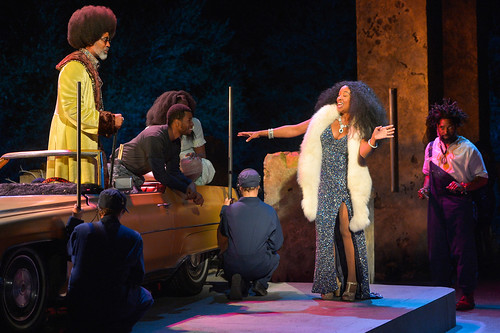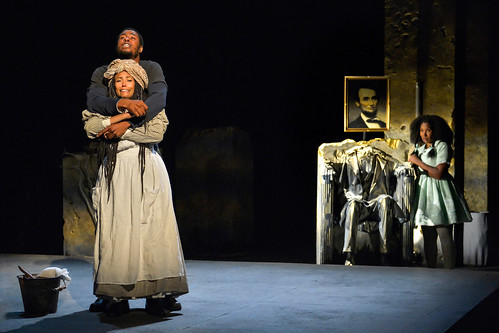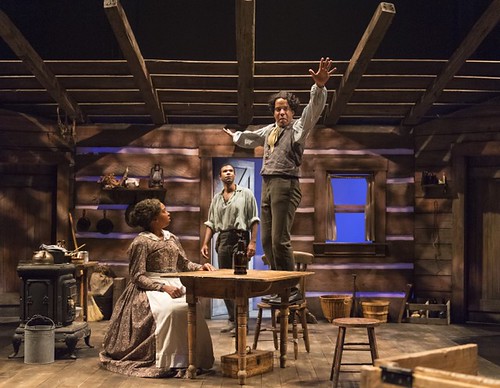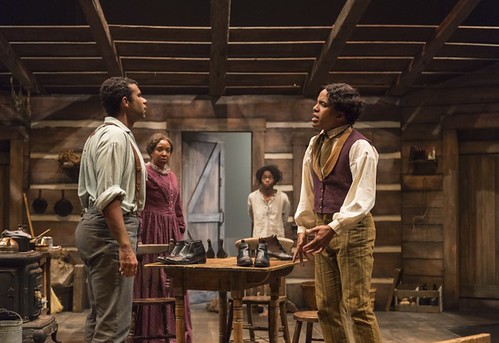
The cast of California Shakespeare Theater’s black odyssey by Marcus Gardley includes (from left) Lamont Thompson (Super Fly Tireseas), J. Alphonse Nicholson (Ulysses Lincoln), Safiya Fredericks (Benevolence Nausicca Sabine), Dawn L. Troupe (Caribdiss), and Aldo Billingslea (Great Grand Paw Sidin). Below: J. Alphonse Nicholson as Ulysses Lincoln, Margo Hall as Calypso and Safiya Fredericks as Benevolence Nausicca Sabine. Photos by Kevin Berne
Just when it seems the news can’t get any worse, it gets worse. This weekend in Virginia we saw some of the worst of humanity, with terror, death, hatred and ignorance all on full display. At such times, it can be hard not to give in to that helpless, hopeless feeling of things ever getting better, of our species ever giving over to our better natures rather than constantly reveling in our worst.
Then there’s art. In a quirk of timing for which I will be forever grateful, California Shakespeare Theater opened a new production Saturday night at the Bruns Amphitheater amid the full chilly summer glory of the Orinda Hills. It wasn’t just any production, but one so suited to our troubled times that it seems we should find some way to broadcast it nationally over and over. The play is black odyssey by Oakland-born playwright Marcus Gardley, one of the finest poetic/dramatic voices in the country. It’s a loose adaptation of The Odyssey, but its power is unmistakable as it reaches deep into the human experience to grapple with storytelling as a fundamental means of connecting our lives and our experiences with those of our ancestors – a profound way to find meaning in our time on earth (and perhaps beyond it). More specifically, he’s using Homer’s lost soldier template to tell stories of the African-American experience, to share pain and injustice and triumph and perseverance and love. There is a lot of love in this play, which makes for a deeply moving experience.
In the face of horrific news stemming from horrific behavior, it is…”reassuring” or “inspiring” seem too small here…of paramount importance to note that there are artists like Gardley and director Eric Ting (now in his second season as Cal Shakes’ artistic director) and these designers and these actors who are working against the wretchedness simply by doing their jobs, and doing them with compassion, intelligence and a beautiful mix of humor and passion.
black odyssey (its lower-case appearance belies its ALL CAPS impact) serves as a fascinating bookend to another play Ting directed recently, Branden Jacobs-Jenkins’ An Octoroon at Berkeley Repertory Theatre (read my review here). That mind-bending play also deals with the African-American experience and is also highly and wonderfully theatrical. But while Octoroon hits the brain (and funny bone), black odyssey aims more for the heart.
I can’t say I’ve ever been moved by The Odyssey in any form, but Gardley’s ambitious, ferocious re-telling earns its emotions, even while it challenges audiences to just go with it while modern-day ancient gods play a game of chess, both literal and figurative, that affects the fate of mortals below and sends our hero, Ulysses Lincoln, back and forth in time and space. In the real world, he’s a 21-year-old from Oakland who has been in love with the same girl, Nella Pell (or “Nella P” as he calls her) since they met in a group home at age 13. The two get married and are expecting a baby when Ulysses enlists during peacetime, thinking that’s the best way to ensure his college education. But then 9/11 happens, and he’s deployed to Afghanistan, where he inspires the wrath of the god of the sea, known here as Great Grand Paw Sidin.
On his way back to the U.S., Ulysses is swept from the deck of his boat and given up for dead. His 16-year journey back home takes him all kinds of bizarre places, all of which are meant to help him become less lost in every sense of the word. To find home, he must connect with his own personal past, his cultural past and connect with his ancestors.
Back home in Oakland’s Acorn housing project (Gardley loves to name drop his hometown), Nella is visited by the goddess Athena, in the guise of a long, lost relative, and ends up trading her immortality for life on earth helping Nella raise her son, Malachi, all the while trying to keep the hope of Ulysses’ return alive.
The Oakland scenes offer a gritty reality (not unlike another recent lower-case play, Shotgun Players’ production of brownsville song (b-side for tray) by Kimber Lee – read my review here), while Ulysses is in a time-warp fever dream that kept calling to mind a modern-day The Skin of Our Teeth by Thornton Wilder in the way it creates an irreverent apocalyptic epic that never loses its human scale.
Ulysses, played by the charismatic J. Alphonse Nicholson, encounters all kinds of people and places in his journey, most notably a family living on the roof of their Louisiana home desperately trying to survive 40 days and 40 days of flooding as the end of days approaches. Ulysses is washed onto their roof by Hurricane Katrina, and from their soon-to-be-submerged perch, they can see in the distance Emmet Till dangling from a tree but not yet dead. In another direction they see the Scottsboro Boys, waiting in vain for justice, and the Birmingham Four, the little girls killed in a church bombing. It’s a grim place, and the parents (Michael Gene Sullivan and Dawn L. Troupe) reluctantly send their 10-year-old daughter, Benevolence (Safiya Fredericks), off with Ulysses for her best chance of survival.
To keep his young charge entertained, Ulysses tells her stories of his journey, including his time in Circe’s undersea den, which happens to be in the middle of the Middle Passage. You can’t get to your destination from there unless you have a past. Until Ulysses figures out his own, he is royally wined and dined by his hostess (played with jazzy verve by Troupe), who nearly steals the entire show with her lusty prayer before digging into the fantasy meal of all fantasy meals.
Another stop on his route involves a stylishly suited blind man atop a rolling Cadillac – Super Fly Tireseas (Lamont Thompson, who also plays the Zeus-like Daddy Deus) – who helps him navigate past Scylla- and Charybdis- like monsters who take the form of Diana Ross, Tina Turner and James Brown.
The most moving part of Ulysses’ journey takes him to slave quarters, where he is tended to with the utmost love and care by his great grandmother, played be the ever-extraordinary and surprising Margo Hall, who also plays Athena (aka Great Aunt Tina). This scene has incredible power and beauty, and the set by Michael Locher helps create one of the most incredible stage pictures in recent memory.
While all of this is going on, we also keep focus on the domestic drama of Nella (the invaluable Omozé Idehenre), rebellious teen Malachi (Michael Curry) and Aunt T. As if life weren’t difficult enough for them, a disguised Paw Sidin (Aldo Billingslea, simultaneously hilarious and menacing) is attempting to complicate their struggles even further by meddling with Nella’s affections and her desperation to do right by her son.
It’s a lot to deal with in 2 1/2 hours, but Gardley and Ting and this phenomenal cast keep it all rolling along. One of the great advantages of this production is its frequent use of choral music, which amplifies the heart and soul of the story. Credit Linda Tillery and Molly Holm for raising these voices to such a glorious place full of spirituals and blues and jazz and pop and an original song at the end that may just crack your heart wide open.
There’s so much beauty in this production – choreography by Latanya D. Tigner, stunning costumes by Dede M. Ayite – and so much pain in the story. Gardley’s words have poetry and pathos and power along with humor and defiance. And, as I said before, a love that lingers like a light in the dark.
FOR MORE INFORMATION
Marcus Gardley’s black odyssey continues through Sept. 3 in a California Shakespeare Theater production at the Bruns Amphitheater, 100 Shakespeare Festival Way, Orinda. Free shuttles between Orinda BART and the theater. Tickets are $20-$92. Call 510-548-9666 or visit www.calshakes.org.



